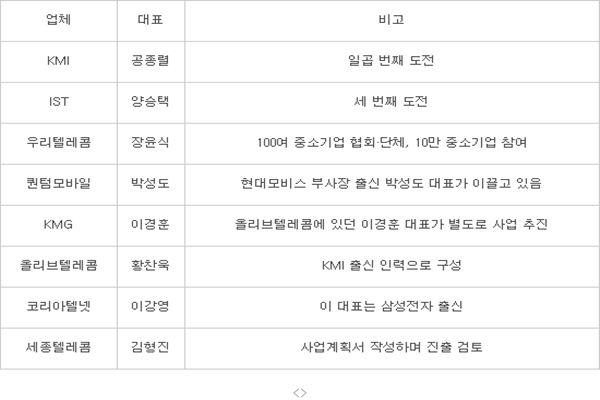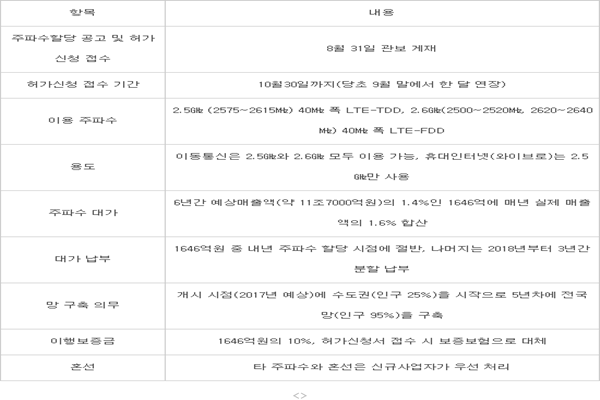4th race for choosing a mobile communication business has started.
Ministry of Science, ICP, and Future Planning (MSIP) is extending an application period for 4th mobile communication business for a month and will be receiving applications until end of October. Business candidates that had been pushing for this business are coming to surface, and it is expected that they will put all of their business capabilities into capital attraction in the last minute.
MSIP published announcement of frequency assignment for new key telecommunications service provider on its official gazette on the 31st and will be receiving permission applications. Publishing of official gazette is a process of letting businesses know publically about each legal items so that they can become effective. In other words, a process of selecting 4th mobile communication business has become full-scale.
Announcement of frequency assignment has information about frequency range and type, period of using frequency, uses, assignment method and time, cost, obligation to establish network, deposit, and others in detail. Time table for receiving permission application has been extended to end of October from end of September previously. This was done to accommodate candidates’ opinions about how time is very tight and it is predicted that this extension would not bring much change in overall schedule.
CEO Jang Yoon Shik of Woori Telecom said that he is thankful that government reflected on businesses’ opinions and that government has done everything now to provide businesses with what they want.

Frequency is to be used by LTE-TDD that uses 40 MHz bandwidth (2575~2615 MHz) and LTE-FDD (2500~2520 MHz, 2620~2640 MHz) that uses 40 MHz bandwidth.
Time table for using frequency is about 6 years from early 2016, when a permit is issued (time when frequency is assigned, expected to be March), to December of 2021. Although mobile communication business can select both 2.5 GHz and 2.6 GHz, it has to use 2.5 GHz bandwidth for Wibro. It is expected that there are not any candidates that will apply for permission application through Wibro.
Cost to use frequency is $140 million (164.6 billion KRW), which is 1.4% of expected sales for 6 years (about $9.9 billion (11.7 trillion KRW)), and a business has to pay 1.6% of actual annual sales separately. Half of $140 million needs to be paid at the time of frequency assignment, and the rest needs to be paid equally for 3 years starting from 2018. Deposit (10%) that needs to be paid while applying for permission is replaced as surety insurance.
MSIP calculated expected sales of 4th mobile communication business by considering current state of previous business’s use of frequency and market situation. A fact that sales of 4th mobile communication business is gradually increasing has became a prerequisite in MSIP’s calculation. Although candidates were discontent about high expected sales, MSIP thinks that absolute amount is actually lower than frequency auction method.
Starting from the time when business starts (expected to be 2017) around metropolitan area (25% of population), communication network needs to establish country network (95% of population) in 5 years. If bandwidth of this frequency gets crossed with bandwidth of different frequency, new business needs to take care of it on its own first.
Although application period has been extended for a month, this does not mean that possibility of establishment of 4th mobile communication business has been increased because candidates are still being pestered by formation of stockholders. 6 to 7 other businesses including well-known businesses such as KMI and Woori Telecom are continually being on the move to secure investors. It seems however that there is not much movement from large businesses such as CJ and others that are being considered as candidates.
Staff Reporter An, Hochun | hcan@etnews.com

